Greenpeace SLAPPed for $600 Million?
Air Date: Week of March 28, 2025
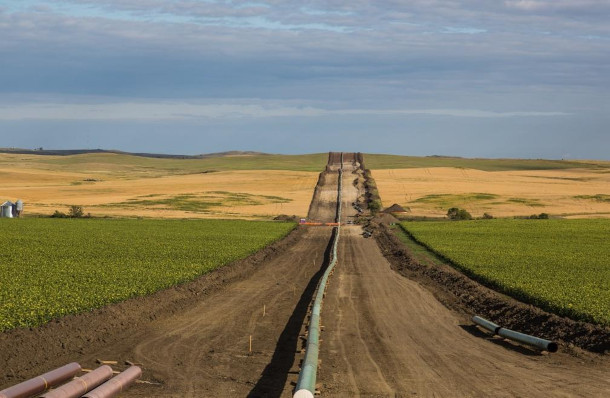
Shown above is the Dakota Access Pipeline, as seen from New Salem, North Dakota. The Standing Rock Sioux Tribe opposed the pipeline’s construction, saying that it threatens sacred sites and the tribe’s water supply. (Photo: Tony Webster from Minneapolis, Minnesota, Wikimedia Commons, CC BY-SA 2.0)
A North Dakota jury found in favor of pipeline company Energy Transfer and ordered Greenpeace to pay more than $600 million in damages over its role in helping protest the Dakota Access Pipeline. Environmental law expert Pat Parenteau joins Host Steve Curwood to explain why he sees the case as a classic SLAPP or Strategic Litigation Against Public Participation suit and a threat to free speech.
Transcript
DOERING: It’s Living on Earth, I’m Jenni Doering.
CURWOOD: And I’m Steve Curwood.
Nearly a decade ago in April of 2016, a remote stretch of the Missouri River became the site of a major protest led by the Standing Rock Sioux against the construction of the Dakota Access pipeline. The tribe feared that an oil spill could contaminate their sacred sites as well as the river that supplies their water, so they formed “water protector” camps near pipeline construction. Eventually, over a thousand people from all over the world joined the protest, some camping out for weeks. But pipeline developer Energy Transfer was determined to finish construction, and in late 2016 local police and private security hired by the company clashed with protesters. Freelance journalist Sandy Tolan was there reporting for Living on Earth and captured a tense encounter when Ponca nation protester Mekasi Camp-Horinek stood his ground.
DEMONSTRATORS: I’m here to uphold traditional law. I’m here to uphold treaty law which is the supreme law of this land.
SHERIFF: You really believe that? So you should just take anybody's house you want because you know it's yours.
CAMP-HORINEK: No. No, I should be able to take back land, that the United States government broke the treaty. We didn't break the treaties. Our people didn't break the treaties, the government broke the treaties.
SHERIFF: We have to enforce private property laws.
CAMP-HORINEK: OK, well you’re going to have to because we’re not moving.
SHERIFF: You’ll be arrested if you’re on private land. We’re here telling you. It is a private property and you have to leave. Mekasi, we don’t want a confrontation.
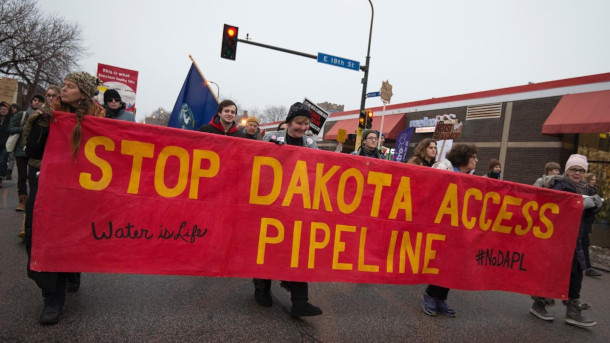
People from around the country protested the Dakota Access Pipeline construction. (Photo: Fibonacci Blue from Minnesota, USA, Wikimedia Commons, CC BY 2.0)
CAMP-HORINEK: I understand that, but listen –
SHERIFF: Please, stand your people down, and go back to the main camp and let’s talk.
CAMP-HORINEK: Highway 1806 is now a no surrender line and that camp is no retreat!
SHERIFF: That’s your final word?
CAMP-HORINEK: That’s the final word.
SHERIFF: Take care gentleman.
TOLAN: The officers walk back to their vehicles, and sense of tense anticipation settles over the treaty camp. The next morning, October 27, the police return – with hundreds of reinforcements.
[SOUNDS OF POLICE RESPONSE AND HELICOPTER]
POLICE: If you’re on that property you will be arrested…
TOLAN: I’m looking at a line of about... at least 100 officers dressed in black and National Guardsmen dressed in camouflage and then county officers dressed in khaki, forming three flanks on either side of military-style vehicles including a mine-resistant vehicle that has been designed for use against IEDs in Iraq and is being deployed here against very raucous – but so far unarmed – peaceful resisters.
CURWOOD: That’s an excerpt of reporting by Sandy Tolan from 2016. Sandy reported that day the authorities advanced and deployed pepper spray, rubber bullets, beanbag rounds and tasers before arresting around 140 people. The protesters kept resisting for months but after hundreds of arrests and injuries, the camps eventually disbanded and the pipeline was completed in April 2017. In 2020 federal district judge James Boasberg ordered the pipeline to shut down pending environmental review, but his decision was quickly reversed on appeal. And after all that, it appears there was still more for the protesters to lose. Energy Transfer headed to court in 2018 to sue the environmental activist organization Greenpeace for aiding the protesters. And after years of litigation working its way through the courts, on March 19 of this year a North Dakota state court jury found in favor of Energy Transfer, ordering Greenpeace to pay more than $600 million in damages. Vermont Law and Graduate School Emeritus Professor Pat Parenteau joins us now to discuss the case and its potential consequences. Hey Pat, welcome back to Living on Earth!

If Greenpeace is forced to pay the over $660 million a North Dakota court awarded to Energy Transfer, the environmental advocacy organization will likely go bankrupt. (Photo: Greenpeace, Wikimedia Commons, CC BY-SA 4.0)
PARENTEAU: Thanks, Steve, good to be with you.
CURWOOD: So we're talking about this case against Greenpeace, where a North Dakota court has awarded Energy Transfers something on the scale of more than $600 million, well, because of Greenpeace's involvement with the Dakota Access Pipeline protest. So first question for you, Pat, why does this ruling cause a chilling effect for activists in your view?
PARENTEAU: Well, because it potentially will bankrupt Greenpeace, one of the most well-funded and active environmental organizations in the world, right? There are three different entities of Greenpeace, the Greenpeace USA, Greenpeace International, and the Greenpeace Fund. But collectively, this is a tremendous blow. I mean, it has seismic proportions to it. $667 million was the latest tally. We've never seen anything like that in all of these cases against environmental groups. So, chilling effect, oh, my God. I mean, it's more than that. It's, "Don't you dare raise your voice in opposition to what fossil fuel industry is doing." That's what it says.
CURWOOD: You know, some call this a SLAPP suit. Remind us of what that is and why that claim is made in this case.
PARENTEAU: Right, it stands for the Strategic Litigation Against Public Participation, SLAPP. And these are cases like this one, where powerful companies and here we're talking Energy Transfer, a $70 billion a year corporation, bringing suit against Greenpeace and pummeling them with all the litigation related costs. There were over 100 depositions in this case, for example, each one of those is incredibly expensive. So the idea here is, you bring a lawsuit. You challenge these groups, as in this case, defamation, trespass, tortious interference with business reputation and so forth. This is the playbook of SLAPP suits. You bring a lot of really high-octane allegations, and you try to intimidate the environmental group. And sometimes it isn't environmental, it could be other groups as well, into quitting, into giving up. And then you try to intimidate them further to never bringing another action against them, whether it's a direct action, a disobedience action or protest action, whatever it is, this is to send a economic signal to the environmental community, you better not do it.
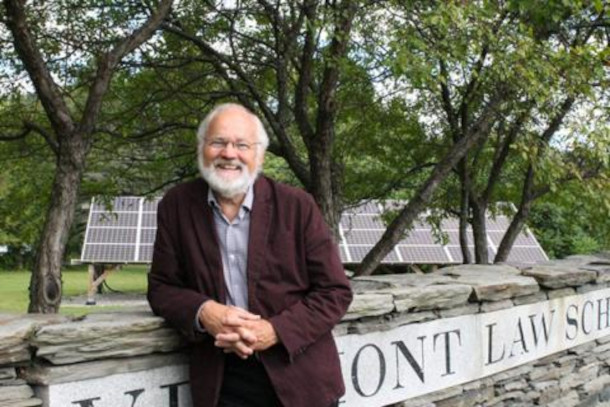
Pat Parenteau is a professor at Vermont Law and Graduate School. (Photo: Vermont Law and Graduate School)
CURWOOD: So in this case, right now, there's a $667 million possible award here, but before there was even an award made in this case, what do you think it costs Greenpeace, how expensive is it to face something like this kind of SLAPP suit?
PARENTEAU: Well, they were fortunate in having a lot of lawyers donating their time, as we call it, pro bono. If they hadn't had access to that kind of legal support, it would have been in the millions, easily, a case like this that's been in the court. And by the way, this is the second case that Energy Transfer has filed. The first one they filed in federal court under what we call RICO, the racketeering law, alleging all kinds of spurious criminal behavior. The federal district court wasted no time dismissing that case. That was an example of how a SLAPP suit can be dismissed on the grounds that it's just frivolous, right? So after Energy Transfer lost that case, they immediately filed this case, the one we're talking about, in state court. So when you add up all of the legal bills and all of the costs associated with litigation, you are talking seven figures easily before the verdict that we're going to be talking about.
CURWOOD: So if the federal court found the action brought by Energy Transfer was frivolous, what are Energy Transfer's claims against Greenpeace that stood up in the state court?
PARENTEAU: Right, so they had about three or four major ones trespass because, of course, the protests, which involved well over 100 Native American tribes. So you had this multi-year demonstration occupation going on. And naturally, when you have, I mean, at one time, I think there were like 2000 people, some of them campedin the wintertime, over extended periods of time. So trespass is a classic allegation in a demonstration like this, when you're trespassing on private property owned by Energy Transfer. Greenpeace maintains that it never was physically present at the site. Energy Transfer says they were, so that's one of those disputed issues, but the point is that they were brought in by the tribe. They did provide funding and training. They provided solar equipment to try to power some of the camps that were set up up there in the wintertime and so forth, trespass, defamation, and vandalism. So there were some incidents of, attempts to, I guess, disable some of the construction equipment. Again, Greenpeace says we had nothing to do with that. But what Energy Transfer is claiming is, "Yeah, but you orchestrated all this. You fomented this kind of activity. You supported it." So, you know, that's what went to the jury. And then, of course, you get to the question of, okay, what was the jury? And perhaps we should talk about that.
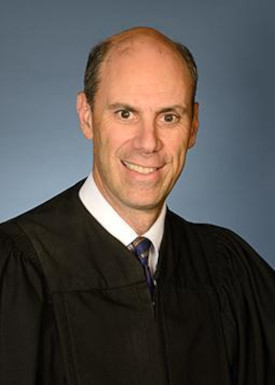
Judge James E. Boasberg. In July of 2020 Judge Boasberg ordered operation of the Dakota Access Pipeline suspended until the US Army Corps of Engineers completes an environmental impact statement. His order was overruled on appeal. (Photo: United States District Court for the District of Columbia, Wikimedia Commons, public domain)
CURWOOD: We will. What's the quality of the jurisprudence in this case? The judge, the jury? What are we looking at?
PARENTEAU: Now, one interesting thing is this is in a very rural county around Mandan, North Dakota, and one interesting point is that all of the judges in this county recused themselves, said "we don't think we can fairly administer a trial." So they had to bring in a judge from another location in North Dakota. This judge didn't volunteer for this. He was assigned, he was told, to conduct this trial. He's never conducted a trial like this. Of course, this is a pretty major undertaking, and certainly has no experience with First Amendment rights, for example, which are central to a case like this. And this judge had no experience with that. The jury is another interesting thing. You're talking about people who had to live with a protest that went on for over a year. I think it was almost two years and a lot of uproar. There were dogs being sicked on people. There were pepper spray being used on people. There was some incidents of outright violence, fist fights and so forth. So you've got people that were marinating, if you will, in all of this protest activity, and then they're asked to sit and be impartial in rendering a judgment? And when you look at the size of this award, $300 million of what we call compensatory damage, or actual damage, and another $300 and plus million for punitive damage, and just the sheer size of this award tells you this was a jury likely predisposed in favor of Energy Transfer and against Greenpeace. It did take them two days of deliberation, but that's probably just because it took so long to add up all the damages, right? So this is, I think, one of the issues on appeal is going to be whether or not this jury was biased to the point where nothing that Greenpeace would have said would have changed their mind.
CURWOOD: So what does happen next? How likely is this case headed to the North Dakota Supreme Court, and what are the pluses and minuses for Greenpeace's position at that court? If the judge is inexperienced, how many mistakes might that Judge have made, do you think?
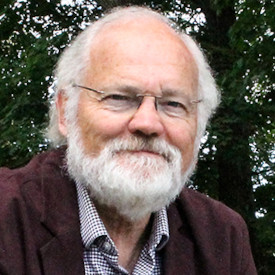
Parenteau fears that if the case makes it all the way to the United States Supreme Court our First Amendment rights could be infringed. (Photo: Vermont Law and Graduate School)
PARENTEAU: Yeah, I mean, we're going to see a number of assertions of error. There were lots of rulings, as you might imagine, on evidentiary matters. You know, will certain things come into evidence or not? I mean, just give you one example of the damages that's been asserted here. Energy Transfer says we calculate that the delays in the permit process, this is primarily a corps of engineers permit to lay the pipeline below the Missouri River where the tribe's water intake facility was, right smack there where they were putting the pipeline right. That's what the tribe was mainly concerned about. Energy Transfer says that delay in the core permitting process cost us $100 million. Now I don't have any idea whether that figure is even accurate. Let's assume it is. How do you attribute to Greenpeace that kind of delay in a permit process? Judge Boasberg ruled in favor of the tribe and in favor of the environmental interests in the case, and said the Corps of Engineers violated the National Environmental Policy Act and other statutes, and awarded relief to them. So it's just an example I'm trying to point out of, how does a jury reach a verdict that delay in the permit process that a court said was justified because the Corps of Engineers violated the law? How do you sock Greenpeace $100 million for that? So all of this says to me, in a normal situation, that kind of jury bias would invalidate the verdict and require a new trial in a different location. Whether that's going to happen in North Dakota, I wouldn't bet on it. North Dakota Supreme Court refused to transfer the case. That's what Greenpeace was trying to do, trying to get it into a more urban area, far removed from the scene of the battle, so to speak. That doesn't bode well for an appeal on some of these grounds, but there will be many grounds, First Amendment grounds, infringement of free speech and so forth. There will be lots of arguments in the North Dakota Supreme Court. I think Greenpeace should win, at least, if not a full reversal, certainly should win a reduction, a radical reduction, in the damages that's been awarded against them, and particularly the punitive damages. But as we always say, we'll have to wait and see.
CURWOOD: So Pat, what grounds if any, could take this case to the United States Supreme Court?
PARENTEAU: That would be the First Amendment questions. If this case were to wind its way to the United States Supreme Court on the question of whether the speech and conduct and activity that Greenpeace engaged in here was protected by the First Amendment or not, I kind of fear the answer to that question. I wouldn't prejudge it, because the First Amendment covers lots of interests on the left and the right. So you'd like to think the United States Supreme Court would treat an issue like this with the respect that it deserves, regardless of the parties that are involved, but you have very powerful corporate interests on one side, and what I think the court would perceive to be troublemakers on the other side. It's a little scary to think about what might happen if that case were to get to the Supreme Court. So those that are thinking about this, you've got to be careful these days about what you wish for and whether or not, strategically, this is a case that you want the United States Supreme Court to decide.
CURWOOD: Pat, by the way, I understand that Greenpeace is taking Energy Transfer to court in the Netherlands. What's the situation there?
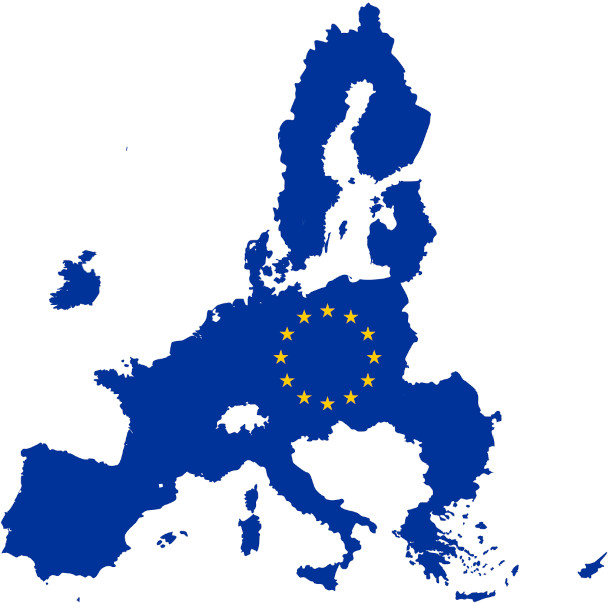
Thanks to a rule in the European Union, Greenpeace is suing Energy Transfer in the Hague District Court. It’s unclear whether the Hague District Court has any jurisdiction over Energy Transfer since the company doesn’t operate in the Netherlands. (Photo: RustamAug, Wikimedia Commons, CC BY-SA 4.0)
PARENTEAU: Yeah, so this is fascinating. So in the European Union, there's what we call a directive. It'd be a rule here in the United States. It has legal force, and it's an anti SLAPP rule. So it provides a cause of action in the country, in this case, the Netherlands, where the party that's complaining about being the victim of a SLAPP suit, in this case, Greenpeace International, is located, is incorporated. So Greenpeace International is incorporated in the Netherlands, it brought an action in The Hague District Court of the Netherlands against Energy Transfer. And it's a very, very detailed, there's a name for it. We would call it a complaint. And it's incredibly detailed. I just, I just got done reading it, it's like 30 pages. It's a very strong complaint. I mean, I've talked to some European lawyers who say it's a slam dunk. But here's the thing, how does the Court in the Hague get jurisdiction over Energy Transfer? Energy Transfer has no presence in the Netherlands. They don't do business there. They don't sell products there. They have no contacts. In the United States, that would mean there's no jurisdiction over them. I don't know what it means in The Hague District Court. We'll have to wait and see. The other thing is, once a jury has rendered a verdict in a case in favor of the party who brought it, is it still a SLAPP suit? I don't know the answer to that either. That'll have to be decided by the Hague Court, and there's no precedent. But they might get a default judgment if Energy Transfer opts not to show up and say, you don't have jurisdiction. We're not even going to appear. The court could issue a default judgment, and it would be based on whatever calculation of damage that Greenpeace International can prove. The problem there would be then you have to get that judgment transferred to the United States so it can be enforced. And then you have a question of whether a United States court would recognize a judgment from another country where the US corporation doesn't do business. These are all new, new issues for all of us to sort through. It's a sign of the times for sure.
The video below was published by Energy Transfer about the case the company first filed in Federal Court against Greenpeace and others, which was dismissed. The subsequent filing in North Dakota state court resulted in the 2025 awarding of more than $600 million in damages.
CURWOOD: Pat, what does this case say about these times and the state of play for climate activists and First Amendment rights of free speech and assembly the way business has been done over let's say the last generation, or even the last century of protests here?
PARENTEAU: Well, it's a more perilous time than it's ever been. It's not that environmental groups have never been sued, but this is different now. The verdict awarded, the circumstances under which it was adjudicated, the determination of a company to actually put a major environmental organization out of business. That's new. The fact that we're seeing Exxon suing shareholders successfully and forcing those shareholders to agree in a settlement they'll never bring another shareholder petition challenging what Exxon is doing. Exxon suing the Attorney General of California, the Attorney General of Massachusetts for defamation. This is what we're seeing. We're seeing a pattern, very aggressive actions to punish, intimidate, not just environmental groups, but anyone who stands in the way of some of these powerful corporations. And they're being emboldened by decisions like this and by what's coming out of Washington, DC and the White House right now, I think it's providing what's sometimes called a permission structure to bring cases like this to silence critics. Unfortunately, for the moment, anyway, we seem to be stuck in that kind of a cycle.
CURWOOD: Pat Parenteau is an emeritus professor of law at the Vermont Law and Graduate School. Pat, thanks so much for taking the time with us.
PARENTEAU: Thanks for the opportunity, Steve, appreciate it.
CURWOOD: After the verdict Energy Transfer called this “a win for all law-abiding Americans who understand the difference between the right to free speech and breaking the law. That the disrupters have been held responsible is a win for all of us.” More of their statement is on the Living on Earth website, loe.org.
Energy Transfer Statement
"While we are pleased that Greenpeace has been held accountable for their actions against us, this win is really for the people of Mandan and throughout North Dakota who had to live through the daily harassment and disruptions caused by the protesters who were funded and trained by Greenpeace. It is also a win for all law-abiding Americans who understand the difference between the right to free speech and breaking the law. That the disrupters have been held responsible is a win for all of us."
Links
Learn more about Pat Parenteau
Read the legal documents associated with the case
Sandy Tolan’s 2016 documentary for Living on Earth, "Dakota Pipeline High Stakes"
Living on Earth wants to hear from you!
Living on Earth
62 Calef Highway, Suite 212
Lee, NH 03861
Telephone: 617-287-4121
E-mail: comments@loe.org
Newsletter [Click here]
Donate to Living on Earth!
Living on Earth is an independent media program and relies entirely on contributions from listeners and institutions supporting public service. Please donate now to preserve an independent environmental voice.
NewsletterLiving on Earth offers a weekly delivery of the show's rundown to your mailbox. Sign up for our newsletter today!
 Sailors For The Sea: Be the change you want to sea.
Sailors For The Sea: Be the change you want to sea.
 The Grantham Foundation for the Protection of the Environment: Committed to protecting and improving the health of the global environment.
The Grantham Foundation for the Protection of the Environment: Committed to protecting and improving the health of the global environment.
 Contribute to Living on Earth and receive, as our gift to you, an archival print of one of Mark Seth Lender's extraordinary wildlife photographs. Follow the link to see Mark's current collection of photographs.
Contribute to Living on Earth and receive, as our gift to you, an archival print of one of Mark Seth Lender's extraordinary wildlife photographs. Follow the link to see Mark's current collection of photographs.
 Buy a signed copy of Mark Seth Lender's book Smeagull the Seagull & support Living on Earth
Buy a signed copy of Mark Seth Lender's book Smeagull the Seagull & support Living on Earth

